外研社 新职业英语 第二版 职业综合英语1 教案
外研社 新职业英语 第二版 职业综合英语1 教案
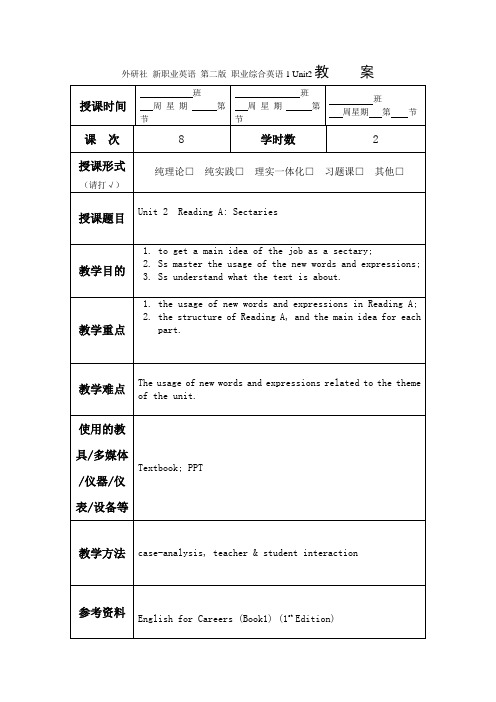
外研社新职业英语第二版职业综合英语1 Unit2教案
说明:1.课程教案应按授课次数编写;重复班授课不再另行编写教案。
2.合班课的“授课时间”可以集中填写。
外研社新职业英语第二版职业综合英语1 Unit2教案
说明:1.课程教案应按授课次数编写;重复班授课不再另行编写教案。
2.合班课的“授课时间”可
外研社新职业英语第二版职业综合英语1 Unit2教案
说明:1.课程教案应按授课次数编写;重复班授课不再另行编写教案。
2.合班课的“授课时间”可以集中填写。
外研社新职业英语第二版职业综合英语1 Unit2教案
说明:1.课程教案应按授课次数编写;重复班授课不再另行编写教案。
2.合班课的“授课时间”可以集中填写。
新职业英语第二版职业综合英语1教案unit1(1)
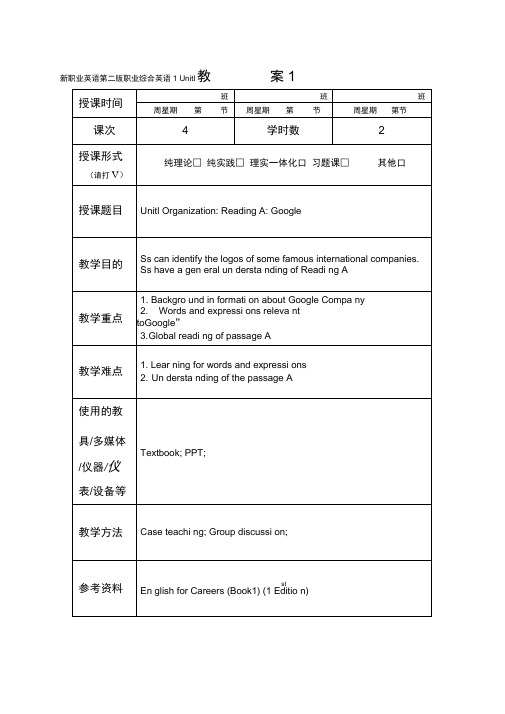
Eg. Household applia nceTCL, Sony, Panasonic, Philips…
Computers: Le novo, Apple, IBM, Sony…
Sportswear: Li-N ing, Adidas, Nike, Reebok…
which the compa nies are headquartered.
Car Companies: BMW (U.S.); Toyota (Japan); Ford (U.S.)
Supermarket: Walmart (U.S.); Metro(Germa ny); Carrafour(Fra nee)
Mobile Phone: Nokia (Finlan d); Sams ung (Korea); Lenovo (Chi na) Backgro und in formatio n: What is a logo?
Task 2.List at least two compa nies for each type of the followi ng products.
Ss have a gen eral un dersta nding of Readi ng A
1. Backgro und in formati on about Google Compa ny
教学重点
2.Words and expressi ons releva nt toGoogle”
3.Global readi ng of passage A
(Ask Ss to prese nt their ideas. Kno wledge in side or outside the text is welcome.)
新职业英语第二版职业综合英语1教案unit1(1)
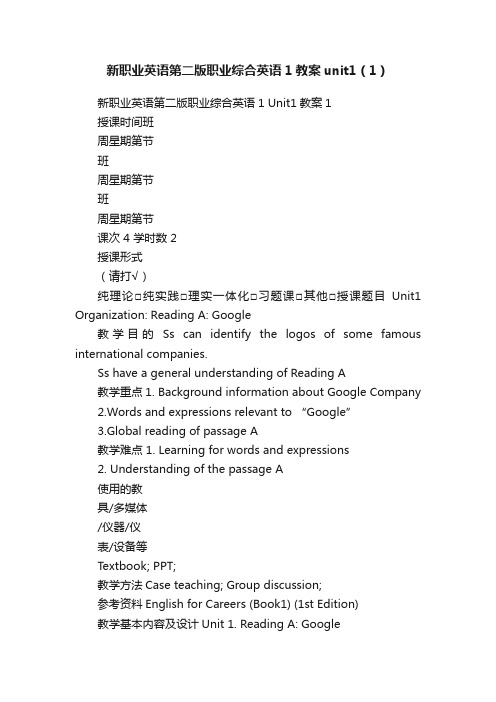
新职业英语第二版职业综合英语1教案unit1(1)新职业英语第二版职业综合英语1 Unit1教案1授课时间班周星期第节班周星期第节班周星期第节课次 4 学时数 2授课形式(请打√)纯理论□纯实践□理实一体化□习题课□其他□授课题目Unit1 Organization: Reading A: Google教学目的Ss can identify the logos of some famous international companies.Ss have a general understanding of Reading A教学重点1. Background information about Google Company2.Words and expressions relevant to “Google”3.Global reading of passage A教学难点 1. Learning for words and expressions2. Understanding of the passage A使用的教具/多媒体/仪器/仪表/设备等Textbook; PPT;教学方法Case teaching; Group discussion;参考资料English for Careers (Book1) (1st Edition)教学基本内容及设计Unit 1. Reading A: GoogleI. Warm-up (15’)Task 1. Look at the following logos and give the names of the countries in which the companies are headquartered.Car Companies: BMW (U.S.); Toyota (Japan); Ford (U.S.) Supermarket: Walmart (U.S.); Metro(Germany); Carrafour(France) Mobile Phone: Nokia (Finland); Samsung (Korea); Lenovo (China) Background information: What is a logo?Task 2. List at least two companies for each type of the following products. Compare the brands and choose your favorite one.Eg. Household appliance: TCL, Sony, Panasonic, Philips…Computers: Lenovo, Apple, IBM, Sony…Sportswear: Li-Ning, Adidas, Nike, Reebok…II. Reading A1.Global reading (25’)(1) Listen to the passage and read the new words(2) information collectionWhat do you know about "google"?What search engine do you often use to find information about something on the Internet?(Ask Ss to present their ideas. Knowledge inside or outside the text is welcome.)Periods and events about google according to the events.Google began as Larry Page’s research project.Page and Sergey set up the company and registered the /doc/3c13833228.html,.The search engine grew quickly and it began to sell advertising on the website.Google has acquired /doc/3c13833228.html, and continues toadd new features. Google has also owned Blogger and other hot websites and become the leader in terms of ad-based revenue on the web.2.While reading(50’)(teacher explain the structure of the text and key words and expressions) Achieve (vt.)Achieve + n. (sth good)e.g. After 10 years of hard work, he finally achievede.g. In addition to the apples you asked for, I bought you some oranges and bananas.tend to: to be likely to do somethinge.g. 1. Women tend to live longer than men.2. When I’m tired, I tend to make mistakes.stay away frome.g. I want you to stay away from my home.excel (at/in)v. to be very good at doing somethinge.g. 1. The school excels in sports.2. She has always excelled at foreign languages.in terms of: from the point of view of; with regard to; concerninge.g. In terms of environmental protection, this project is excellent.the brain child (of somebody): an idea or invention of one person or a small group of people课后作业/思考题Review what we have learned this periodTask 2 Correct the following statements according to the passage教学后记说明:1.课程教案应按授课次数编写;重复班授课不再另行编写教案。
新职业英语《综合英语2》教案Unit 1 Teaching Plan【范本模板】
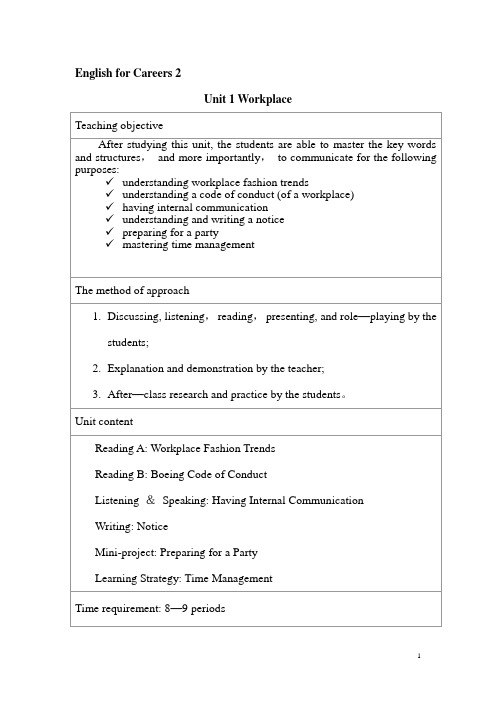
English for Careers 2Unit 1 WorkplaceB—4 C—5 D-3 E-6 F-2 G-7Task 2 10 minutes Objective: Ss can give directions.Steps:•Ss read Warming-up Task 2。
•Get Ss to look at the picture of Task 1。
•Ask Ss to work in pairs and tell each other how to find Mike and Jack in the office。
•Ask some Ss to report in class。
•Give the suggested answers。
Suggested answers:Go through the reception room to the hallway. The first room on your left is the multifunction meeting room. Mike is having a meeting there. Keep going straight along the hallway till you get to the end of it. Jack is working in the last staff office on your left.New words in Reading A 15 minutes Objective: Ss can get familiar with the new words and expressions, etc。
. Steps:• Ss listen to the new words and expressions, etc。
• Ss read the new words and expressions,etc.Our national policy fits in with the changed international situation。
外研社新职业英语第二版职业综合英语1教案unit1(3-4)
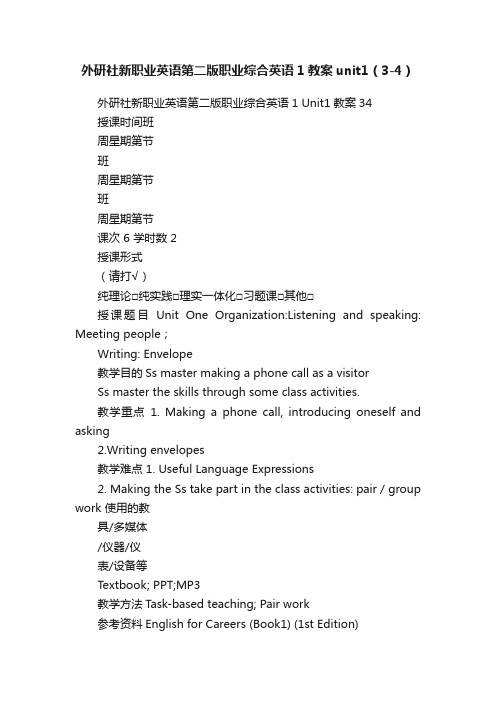
外研社新职业英语第二版职业综合英语1教案unit1(3-4)外研社新职业英语第二版职业综合英语1 Unit1教案34授课时间班周星期第节班周星期第节班周星期第节课次 6 学时数 2授课形式(请打√)纯理论□纯实践□理实一体化□习题课□其他□授课题目Unit One Organization:Listening and speaking: Meeting people;Writing: Envelope教学目的Ss master making a phone call as a visitorSs master the skills through some class activities.教学重点1. Making a phone call, introducing oneself and asking2.Writing envelopes教学难点 1. Useful Language Expressions2. Making the Ss take part in the class activities: pair / group work 使用的教具/多媒体/仪器/仪表/设备等Textbook; PPT;MP3教学方法Task-based teaching; Pair work参考资料English for Careers (Book1) (1st Edition)教学基本内容及设计I. Listening and speaking(45’)Task 1 VISITORS:12th SeptemberListen to the conversation between a receptionist and a visitor. Then fill in the missing information.Keys: First name: Ralph Last name: Sayers/doc/485636007.html,pany: JOD TechnologiesTask 2Mr. White is meeting with Mr. Brown from the Head Office. Listen to the conversation and match the people below with their job titles.Keys: Mr. Brown --- Production ManagerMary --- SecretaryMr. Walker --- Sales ManagerTask 3Listen to the conversation and decide whether the following statements are true or false. Then write key words to support your answers.Keys: 1. True 2. False ( doesn’t know who to see )3. False ( on the 30th floor )4. False (where, lift, 30th floor )Task 4Listen to the conversation and choose the best answer to each question you hear.Keys: 1. D 2. C 3. ATask 5Listen to the following speech twice and fill in the blanks with what you hear.Keys: chairman, first of all, business, manage, informationTask 6Work in pairs. Introduce yourself to your partner and ask questions about him/her with the useful expressions.Useful Expressions:GreetingHow do you do?I’ve often heard about you.I’ve heard so much about you.Making introductionAllow me to introduce myself.My name is …I’m …, from …Asking questionsWhere were you born?What do you do in your spare time?Did you grow up here?Why did you choose this major?EndingNice talking to you.It’s so nice to finally meet you.Nice to meet you, too.I t’s a ple asure to meet you.II. Writing: Envelope (45’)Task 1. Format of an envelope1. the recipient's address: the middle of the envelope2. the sender’s address: the upper left corner of the envelope3. Stamp: the upper right corner of the envelopeTask 2: Read Sample 1 and answer the questions below.Key to the questions:1.West Palm Beach.2. Liu Fang.3. Michael Ryan4. Crescent Finance Company, 502 North Olive Avenue, West PalmBeach, Florida 33402, U.S.A.5. Manager of Human Resources.6. China National Machinery Import & Export Corp., 36 Jianshe Road,Beijing 100065, P. R. China.Task 3. Read Sample 2 and complete the following sentences.1. “c/o” on the envelope stands for“care of”2. Jane Ashby__ will receive this letter.3. Craig Moor will open and read this letter.Assignment :Write an envelope for your letter to Tom Jones, who works for Green Technologies as Sales Manager. The company is in New York, at No. 135 on West 20th Street. The zip code is 10011.课后作业/思考题1. Review what we have learned this period2. Write an envelope.3.Preparation the PRESENTATION on P11 before class.(Group work )教学后记说明:1.课程教案应按授课次数编写;重复班授课不再另行编写教案。
外研社 新职业英语 第二版 职业综合英语1 教案unit1(3-4)复习进程

Task 2:Read Sample 1 and answer the questions below.
Key to the questions:
1.West Palm Beach.2.Liu Fang.
3.Michael Ryan
2.Writing envelopes
教学难点
1. Useful Language Expressions
2. Making the Ss take part in the class activities: pair / group work
使用的教具/多媒体/仪器/仪表/设备等
Textbook; PPT;MP3
Keys:Mr. Brown---Production Manager
Mary--- Secretary
Mr.Walker--- Sales Manager
Task 3
Listen to the conversation and decide whether thefollowing statements are true or false. Then write keywords to support your answers.
Task6
Work in pairs. Introduce yourself to your partner and ask questions about him/her with the useful expressions.
Useful Expressions:
Greeting
How do you do?
It’s a pleasure to meet you.
外研社新职业英语第二版职业综合英语1教案unit3(2)
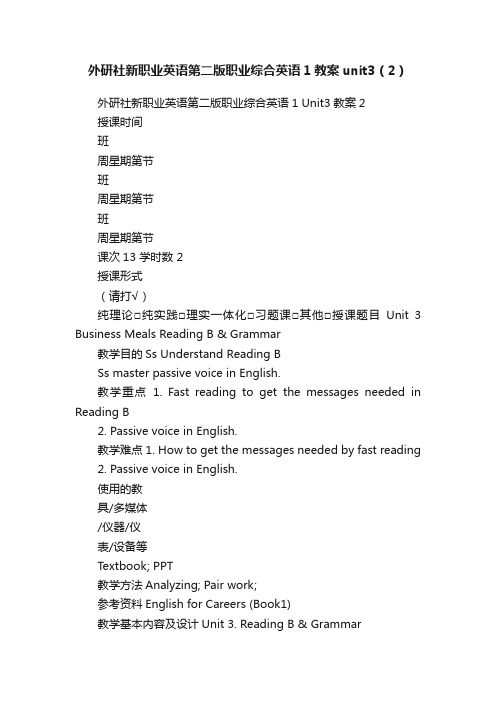
外研社新职业英语第二版职业综合英语1教案unit3(2)外研社新职业英语第二版职业综合英语1 Unit3教案2授课时间班周星期第节班周星期第节班周星期第节课次13 学时数 2授课形式(请打√)纯理论□纯实践□理实一体化□习题课□其他□授课题目Unit 3 Business Meals Reading B & Grammar教学目的Ss Understand Reading BSs master passive voice in English.教学重点1. Fast reading to get the messages needed in Reading B2. Passive voice in English.教学难点 1. How to get the messages needed by fast reading2. Passive voice in English.使用的教具/多媒体/仪器/仪表/设备等Textbook; PPT教学方法Analyzing; Pair work;参考资料English for Careers (Book1)教学基本内容及设计Unit 3. Reading B & GrammarI. Reading B: Friendship Lunch Menu (45’)1. Skimming:Task 1 Decide whether the following statements are true (T) or false (F) according to the menu.2. Matching:Task 2 Fill in the blanks in the following menu with the given dishes.II. Grammar(45’)被动态主要在以下三种情况中使用:1. 不知道动作的执行者时:Everything has been taken away.2. 强调动作的承受者时:I was brought up by my grandma.3. 语气委婉、修辞的需要时:Has the money been paid?2. 被动语态的基本构成:(omitted)被动语态由助动词be+过去分词构成,时态通过be表现出来。
外研社《新标准高职公共英语系列教材:实用综合教程(第二版)》第一册教案 Unit 1 Education
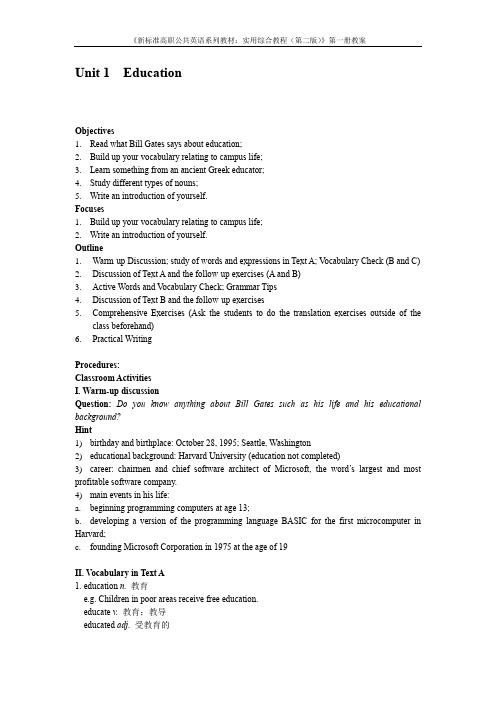
Unit 1 EducationObjectives1.Read what Bill Gates says about education;2.Build up your vocabulary relating to campus life;3.Learn something from an ancient Greek educator;4.Study different types of nouns;5.Write an introduction of yourself.Focuses1.Build up your vocabulary relating to campus life;2.Write an introduction of yourself.Outline1.Warm-up Discussion; study of words and expressions in Text A; Vocabulary Check (B and C)2.Discussion of Text A and the follow-up exercises (A and B)3.Active Words and V ocabulary Check; Grammar Tips4.Discussion of Text B and the follow-up exercisesprehensive Exercises (Ask the students to do the translation exercises outside of theclass beforehand)6.Practical WritingProcedures:Classroom ActivitiesI. Warm-up discussionQuestion: Do you know anything about Bill Gates such as his life and his educational background?Hint1)birthday and birthplace: October 28, 1995; Seattle, Washington2)educational background: Harvard University (education not completed)3)career: chairmen and chief software architect of Microsoft, the word’s largest and most profitable software company.4)main events in his life:a.beginning programming computers at age 13;b.developing a version of the programming language BASIC for the first microcomputer in Harvard;c.founding Microsoft Corporation in 1975 at the age of 19II. Vocabulary in Text A1. education n.教育e.g. Children in poor areas receive free education.educate v.教育;教导educated adj.受教育的e.g. a well-educated maneducator n.教育家,教育者2. count v.派用场,点数e.g. 1) Every seconds counts.2) What counts more is whether you have tried your best.3) to count from 1 to 1004) Count these apples.3. advantage n.有利条件,好处;优点,优势e.g. This product has many advantages.advantageous adj.有利的,有益的,便利的e.g. It is highly advantageous to us.Phrase: take advantage of 很好的使用;利用e.g. take advantage of all educational opportunitiesAntonym: disadvantage n.不利;不利条件e.g. His bad health is a great disadvantage to him when he looks for work.4. lifetime n.一生,终生e.g. 1) a lifetime guarantee2)lifetime membership3) In my father’s lifetime there have been many changes in the village.5. part-time adj.& adv.兼职的(地)e.g. 1)a part-time job2)He works part-time.full-time adj.全职的e.g. a full-time housewife6. programmer n.程序师,编程员program v.编制程序e.g. Please program the computer to do the job instead of doing it manually(手工操作).7. discourage vt. 不鼓励;使泄气,使失去信心e.g. His parents discouraged him from joining the air force.discouraged adj. 泄气的,失去信心的discouraging adj.使人泄气的,使人失去信心的e.g. 1) If you meet difficulty in your study, don’t be discouraged.2) It is discouraging that I didn’t know how to solve the problem.Antonym: encourage vt.鼓励e.g. I encouraged her to work hard and to try to pass the examinations.courage n. 勇敢,勇气e.g. David showed great courage when he saved the child from the burning house.8. diploma n. 文凭,毕业证书e.g. a college diplomadiplomatic adj. 外交的,从事外交的e.g. Julia joined the diplomatic service after her graduation from university.9. project n.项目,课题e.g. 1) an impossible project2) The professor is directing a research project.Synonym: plan10. highly adv. 高度地;非常e.g. 1) a highly interesting story2) a highly paid jobPhrase: speak/ think highly of 赞扬,对…给予很高评价e.g. The leader speaks / thinks highly of our work.11. focus v.(使)集中;(使)聚焦e.g. 1) to focus (one’s mind) in work2) All eyes focused on the speaker.focus n.(兴趣活动等的)中心,焦点e.g. Because of his strange clothes, he immediately became the focus of attention when heentered the office.12. range n. 范围e.g. You have a wide range of choices.range vi.在某范围内变化e.g. The temperature ranges from 10 to 20 degrees.13. attend v.参加,出席e.g. attend schoolattend a lectureattendance n.出席,到场14. automatically adv.自动地e.g. the machine operates automatically.automatic adj.自动的e.g. We have an automatic washing machine.15. drop out of 退学,不参与,退出e.g. 1) He dropped out of school at the age of 10 because his family was too poor to afford thetuition.2) She decided to drop out of the competition because it was not fire.16. chance of a lifetime 千载难逢的良机,一生中唯一的机会e.g. It’s the chance of a lifetime. You will regret it the rest of your life if you don’t take it.17. try out 试验,考验e.g. She bought a cookbook and tried out a few new recipes.18. in short 简而言之,总之e.g. In short, you should study hard for a better future.Synonym: in brief/ to sum up/ all in all/ in conclusionIII. Language Points in Text A1.They want to know what to study, or whether it’s Ok to drop out of college since that’s what I did.what to study: This is a wh-word + infinitive structure used as the object, which can be changed into an object clause. Wh-word + infinitive structure can be used as a subject, an object, or an appositive clause(同位语从句),for example:1)How to improve their English is often discussed among the students.2)We haven’t decided when to visit the place.3)You haven’t answered my question about where to get these books.it’s Ok to drop out of college: Here “it” is used as a formal subject, and the actual subject is the infinitive structure “to drop out of college”. The general pattern is “It is + adj. + (for/ of + sb.) to do sth.” More examples:1)It was very thoughtful of her to come to see me when I was ill.2)It’s easy for me to see through his trick.that’s what I did: “what I did” here is a predictive clause (表语从句)introduced by “what”. It is always structured in the form of “subject + be/ look/ remain/ seem + predictive clause” and can be introduced by such words as “that” (always omitted), and other wh-words, for example:1) It seems (that) it is going to rain.2) This is why I refused to attend the meeting.2. As I’ve said before, nobody should drop out of college unless they believe they face the chance of a lifetime.As I’ve said before: This is a non-restrictive relative clause(非限制性关系从句) introduced by “as”(正如…的那样), which can be placed at the beginning or at the end of the sentence. More examples:1) As people expected, she was admitted to Beijing University.2) Hundreds of people were killed in the earthquake, as I have learned from the newspaper. unless: is a conjunction for an adverbial clause of condition (条件状语从句), which equals “if…not…”(除非).e.g. I won’t leave unless the rain stops.3. In my company’s early years, we have a bright part-time programmer who planned to drop out of high school to work.planned to: intend to do sth.计划、打算做某事e.g. I plan to make a trip to Beijing during the summer vocation.who planned to …work: a restrictive relative clause introduced by “who” since its antecedent is a person and serves as the subject in the clause. The relative pronoun “that” can be used here too. More examples:1) The young man who sits there quietly is my brother.2) I don’t like people that pry into others’ private business.4. Having a diploma certainly helps somebody who is looking to us for a job.look to sb./ sth.: to depend on sb. or sth. for help or advice 指望,依赖e.g. We look to you for support.5. High school and college offer you the best chance to learn many things and to do projects with others that teach you about team spirit.that teach you about team spirit: This is a restrictive relative clause introduced by “that”, whose antecedent acts as the subject of the clause. Actually the relative clause introduced by “that” can be used to modify both the person or the thing, and the roll of “that” can be either the subject or the object.e.g. He was the only one that I knew there.I haven’t been to the place that you have mentioned.6. In high school there was a time when I was highly focused on writing software, but for most of my high school years I had many interests.when …software: This is a relative clause introduced by the relative adverb “when”, which actsas the adverbial of time in the clause.e.g. 1) There was a time when I completely lost my self-confidence.2) I will never forget those days when we were together.7. For me, classroom is not the only place where you can learn.where you can learn: This is a restrictive relative clause introduced by the relative adverb “where”, which is used as the adverbial of place in the clause.e.g. 1) Do you still remember the restaurant where we had dinner last night?2) This is the place where he stayed his whole life.8. In short, it’s a real mistake not to take the chance to study a wide range of subjects and to learn to work with other people because education does count.it’s a real mistake not to take the chance: This is an example of a negative infinitive structure, where “not” is placed before an infinitive.e.g. 1) We are asked not to speak loudly in class.2) It is a good idea not to go out on such a rainy day.IV. Focus on Grammar名词(Noun )一、名词的概念表示人、事物或抽象概念的词叫做名词。
- 1、下载文档前请自行甄别文档内容的完整性,平台不提供额外的编辑、内容补充、找答案等附加服务。
- 2、"仅部分预览"的文档,不可在线预览部分如存在完整性等问题,可反馈申请退款(可完整预览的文档不适用该条件!)。
- 3、如文档侵犯您的权益,请联系客服反馈,我们会尽快为您处理(人工客服工作时间:9:00-18:30)。
外研社新职业英语第二版职业综合英语1 Unit2教案
说明:1.课程教案应按授课次数编写;重复班授课不再另行编写教案。
2.合班课的“授课时间”可以集中填写。
外研社新职业英语第二版职业综合英语1 Unit2教案
说明:1.课程教案应按授课次数编写;重复班授课不再另行编写教案。
2.合班课的“授课时间”可
外研社新职业英语第二版职业综合英语1 Unit2教案
说明:1.课程教案应按授课次数编写;重复班授课不再另行编写教案。
2.合班课的“授课时间”可以集中填写。
外研社新职业英语第二版职业综合英语1 Unit2教案
说明:1.课程教案应按授课次数编写;重复班授课不再另行编写教案。
2.合班课的“授课时间”可以集中填写。
